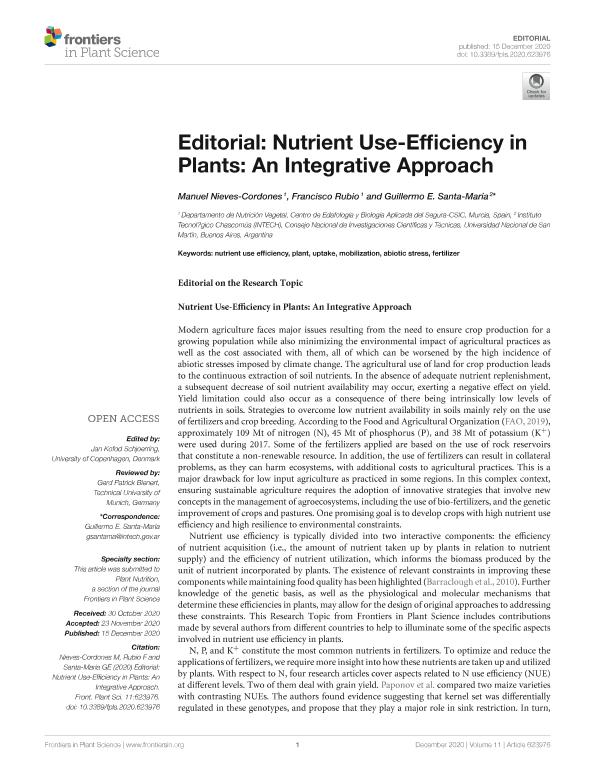Mostrar el registro sencillo del ítem
dc.contributor.author
Nieves Cordones, Manuel
dc.contributor.author
Rubio, Francisco
dc.contributor.author
Santa Maria, Guillermo Esteban

dc.date.available
2021-03-01T14:05:36Z
dc.date.issued
2020-12-15
dc.identifier.citation
Nieves Cordones, Manuel; Rubio, Francisco; Santa Maria, Guillermo Esteban; Editorial: Nutrient Use-Efficiency in Plants: An Integrative Approach; Frontiers Media S.A.; Frontiers in Plant Science; 11; 15-12-2020; 1-3
dc.identifier.issn
1664-462X
dc.identifier.uri
http://hdl.handle.net/11336/126957
dc.description.abstract
Modern agriculture faces major issues resulting from the need to ensure crop production for a growing population while also minimizing the environmental impact of agricultural practices as well as the cost associated with them, all of which can be worsened by the high incidence of abiotic stresses imposed by climate change. The agricultural use of land for crop production leads to the continuous extraction of soil nutrients. In the absence of adequate nutrient replenishment, a subsequent decrease of soil nutrient availability may occur, exerting a negative effect on yield. Yield limitation could also occur as a consequence of there being intrinsically low levels of nutrients in soils. Strategies to overcome low nutrient availability in soils mainly rely on the use of fertilizers and crop breeding. According to the Food and Agricultural Organization (FAO, 2019), approximately 109 Mt of nitrogen (N), 45 Mt of phosphorus (P), and 38 Mt of potassium (K+) were used during 2017. Some of the fertilizers applied are based on the use of rock reservoirs that constitute a non-renewable resource. In addition, the use of fertilizers can result in collateral problems, as they can harm ecosystems, with additional costs to agricultural practices. This is a major drawback for low input agriculture as practiced in some regions. In this complex context, ensuring sustainable agriculture requires the adoption of innovative strategies that involve new concepts in the management of agroecosystems, including the use of bio-fertilizers, and the genetic improvement of crops and pastures. One promising goal is to develop crops with high nutrient use efficiency and high resilience to environmental constraints.
dc.format
application/pdf
dc.language.iso
eng
dc.publisher
Frontiers Media S.A.

dc.rights
info:eu-repo/semantics/openAccess
dc.rights.uri
https://creativecommons.org/licenses/by/2.5/ar/
dc.subject
NUTRIENT USE EFFICIENCY
dc.subject
PLANT
dc.subject
UPTAKE
dc.subject
MOBILIZATION
dc.subject.classification
Agricultura

dc.subject.classification
Agricultura, Silvicultura y Pesca

dc.subject.classification
CIENCIAS AGRÍCOLAS

dc.title
Editorial: Nutrient Use-Efficiency in Plants: An Integrative Approach
dc.type
info:eu-repo/semantics/article
dc.type
info:ar-repo/semantics/artículo
dc.type
info:eu-repo/semantics/publishedVersion
dc.date.updated
2021-02-10T20:44:38Z
dc.journal.volume
11
dc.journal.pagination
1-3
dc.journal.pais
Suiza

dc.description.fil
Fil: Nieves Cordones, Manuel. Centro de Edafología y Biología Aplicada del Segura. Departamento de Nutrición Vegetal; España
dc.description.fil
Fil: Rubio, Francisco. Centro de Edafología y Biología Aplicada del Segura. Departamento de Nutrición Vegetal; España
dc.description.fil
Fil: Santa Maria, Guillermo Esteban. Universidad Nacional de San Martin. Instituto Tecnologico de Chascomus. - Consejo Nacional de Investigaciones Cientificas y Tecnicas. Centro Cientifico Tecnologico Conicet - la Plata. Instituto Tecnologico de Chascomus.; Argentina
dc.journal.title
Frontiers in Plant Science
dc.relation.alternativeid
info:eu-repo/semantics/altIdentifier/url/https://www.frontiersin.org/articles/10.3389/fpls.2020.623976/full
dc.relation.alternativeid
info:eu-repo/semantics/altIdentifier/doi/http://dx.doi.org/10.3389/fpls.2020.623976
Archivos asociados
